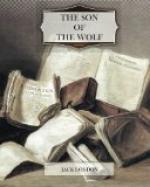’True, they forgot; so let us forget. But hereafter, let them remember. If it should happen they do not...’ He touched his rifle carelessly, grimly. ’Tomorrow they shall carry the flour and see that the white man Joe lies not down by the trail. The cups of flour are counted; should so much as an ounce be wanting at nightfall... Do ye understand? Today there were others that forgot. Moose Head and Three Salmon left the white man Joe to lie in the snow. Let them forget no more. With the light of day shall they go forth and break trail. Ye have heard the law. Look well, lest ye break it.’ Sitka Charley found it beyond him to keep the line close up. From Moose Head and Three Salmon, who broke trail in advance, to Kah-Chucte, Gowhee, and Joe, it straggled out over a mile. Each staggered, fell or rested as he saw fit.
The line of march was a progression through a chain of irregular halts. Each drew upon the last remnant of his strength and stumbled onward till it was expended, but in some miraculous way there was always another last remnant. Each time a man fell it was with the firm belief that he would rise no more; yet he did rise, and again and again. The flesh yielded, the will conquered; but each triumph was a tragedy. The Indian with the frozen foot, no longer erect, crawled forward on hand and knee. He rarely rested, for he knew the penalty exacted by the frost.
Even Mrs. Eppingwell’s lips were at last set in a stony smile, and her eyes, seeing, saw not. Often she stopped, pressing a mittened hand to her heart, gasping and dizzy.
Joe, the white man, had passed beyond the stage of suffering. He no longer begged to be let alone, prayed to die; but was soothed and content under the anodyne of delirium. Kah-Chucte and Gowhee dragged him on roughly, venting upon him many a savage glance or blow. To them it was the acme of injustice.
Their hearts were bitter with hate, heavy with fear. Why should they cumber their strength with his weakness? To do so meant death; not to do so—and they remembered the law of Sitka Charley, and the rifle.
Joe fell with greater frequency as the daylight waned, and so hard was he to raise that they dropped farther and farther behind. Sometimes all three pitched into the snow, so weak had the Indians become. Yet on their backs was life, and strength, and warmth.
Within the flour sacks were all the potentialities of existence. They could not but think of this, and it was not strange, that which came to pass. They had fallen by the side of a great timber jam where a thousand cords of firewood waited the match. Near by was an air hole through the ice. Kah-Chucte looked on the wood and the water, as did Gowhee; then they looked at each other.
Never a word was spoken. Gowhee struck a fire; Kah-Chucte filled a tin cup with water and heated it; Joe babbled of things in another land, in a tongue they did not understand.




